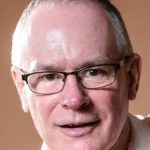Paul Moore: ‘I’d like to share my story with you . . . it has a good ending’
In My Father’s House / Paul Moore
She had prayed for the right way to approach people entering the Planned Parenthood clinic. She’d tried, “Can I share some resources with you?” However, she discovered that people entering or leaving abortion clinics weren’t too interested in receiving “resources.”
Instead, trial, error and prayer taught her to smile and wave as she approached a car, and say, “I’d like to share my story with you” as she handed over a booklet. She followed up with, “If my story doesn’t help you or apply to your situation, please share it with someone whom you think it can help.”
She sometimes added the kicker, “It has a good ending.”
BONNIE’S STORY BEGINS
Bonnie is one of 13 chi1dren. Her father was a Second World War vet who came home with two Purple Hearts, a basket of other medals, and “nightmares for the rest of his life” from PTSD. He was also an alcoholic. Consequently, Bonnie had two fathers. One was kind, humble, and said that his children made him the richest man in the world. The other dad was violent and abusive. He molested Bonnie and her sister, and physically punished her brothers.
Bonnie’s mother, who had come from an abusive household herself, believed that silence was the best policy, preferring a mask of humor to cover up her husband’s contradictions (though Bonnie doesn’t think her mother was ever actually aware of the sexual abuse).
She left home at 18 to join the military and get the GI Bill for college, to travel, and to get away from Dad. On her way to her first posting, she was raped by her sister’s boyfriend’s roommate. On the lookout for someone to protect her, Bonnie moved in with a guy whose main qualification was “a nice smile.” She was soon pregnant, and he pressed for abortion. Two weeks later she passed a store displaying baby clothes and broke down, thinking her sin unforgivable.
LOVED, FORGIVEN, AND SHARING
She would carry this guilt into two marriages, and two more abortions. She would also give the gift of life to three children. Still, every day she would look in the mirror and tell the woman she saw there that she was nothing for what she had done.
A cradle Catholic, Bonnie would go to church, but would not go to Communion. She went to confession three times, but confesses, “I didn’t feel forgiven.”
Slowly, however, God was working in the background. Bonnie found a faith family, and the life-giving word of the Holy Bible. God began to breathe his faith into her, to help her know that she was loved and totally forgiven. Totally. No blemish of sin did He see.
She felt sorrow for her losses through abortion, but she was able to let those children go to God. Through His merciful generosity, she had her children’s lives back because she knew they had gone to Him. As a mother always takes care of her children first, she now had her own life back as well.
Bonnie felt a pull to be part of the effort to reach out to other women who were pregnant and afraid, or already had abortions, with a message of hope. She started to attend pro-life rallies, and to provide prayerful witness at abortion clinics. Yet she’d never talked about her own abortions publicly, even to pro-life colleagues. A vestige of shame still hung over her.
The movie “Unplanned,” the story of abortion provider turned pro-life witness Abby Johnson, changed all that.
That’s the backstory to how Bonnie came to be giving her testimony at the Peoria kick-off rally for 40 Days for Life on Sept. 21. The next day at Planned Parenthood on Knoxville Avenue in Peoria, I watched as she approached a car leaving the parking lot. The car stopped, a window opened, and a woman listened.
As Bonnie says, “It’s not me, it’s Jesus.”
—
 PAUL THOMAS MOORE is a Catholic commentator and singer-songwriter. He and wife Mary Louise attend St. Mary of Lourdes in Germantown Hills. He can be reached at paulthomasmoore@hotmail.com.
PAUL THOMAS MOORE is a Catholic commentator and singer-songwriter. He and wife Mary Louise attend St. Mary of Lourdes in Germantown Hills. He can be reached at paulthomasmoore@hotmail.com.





